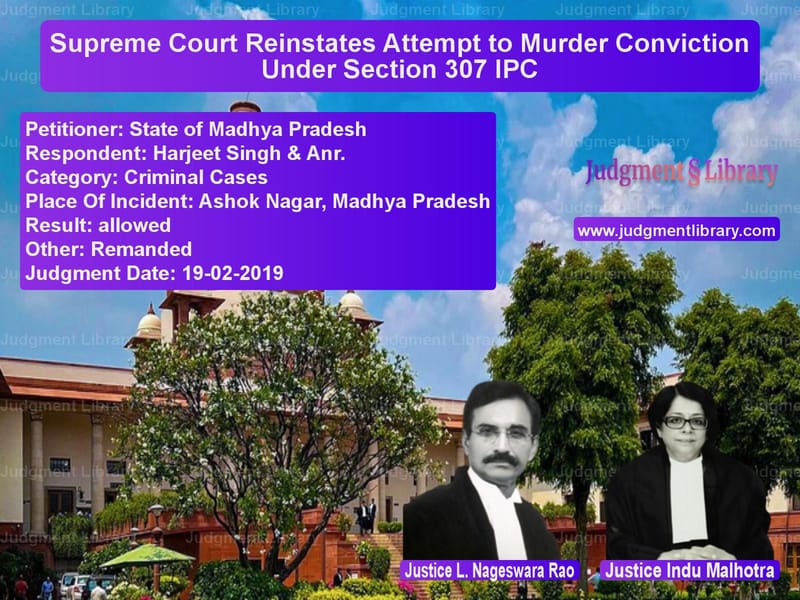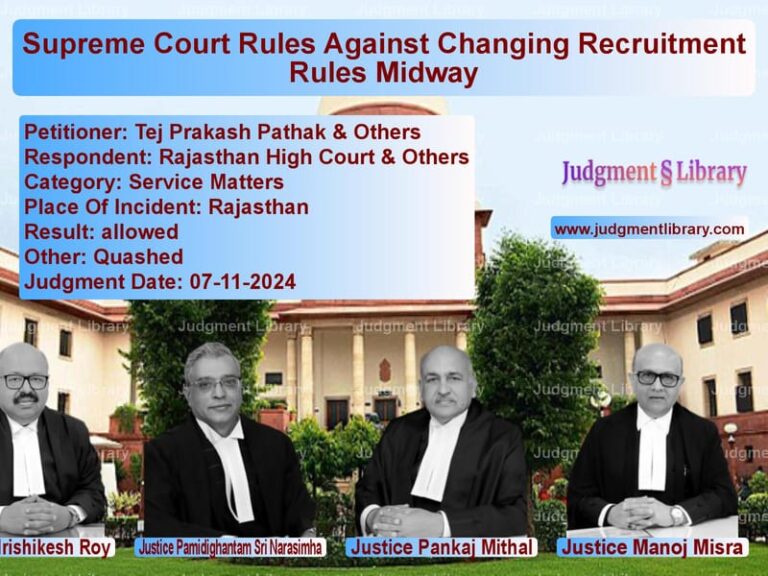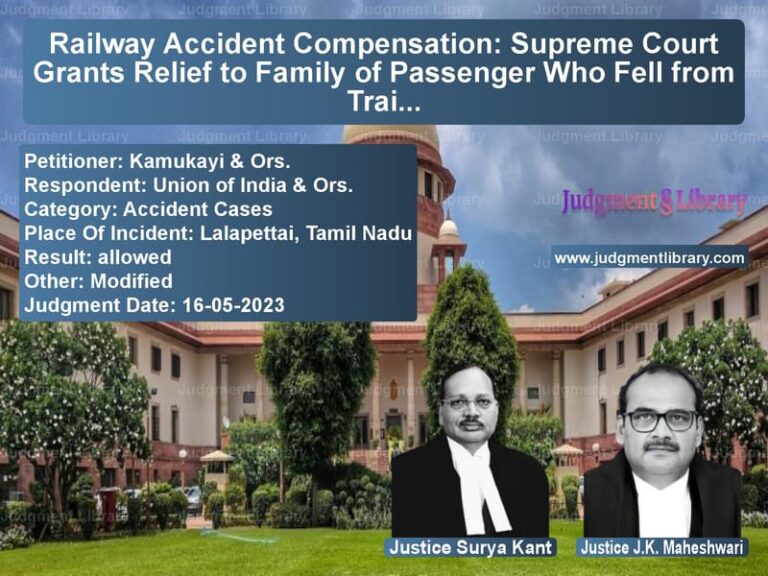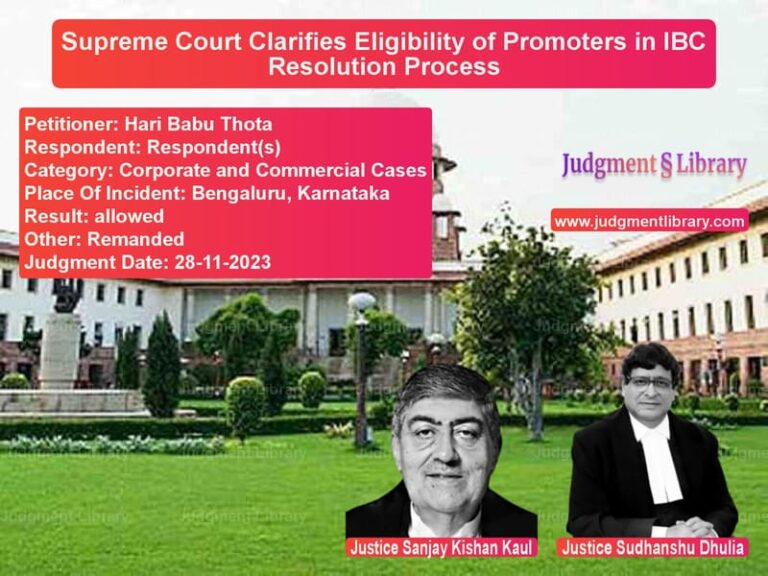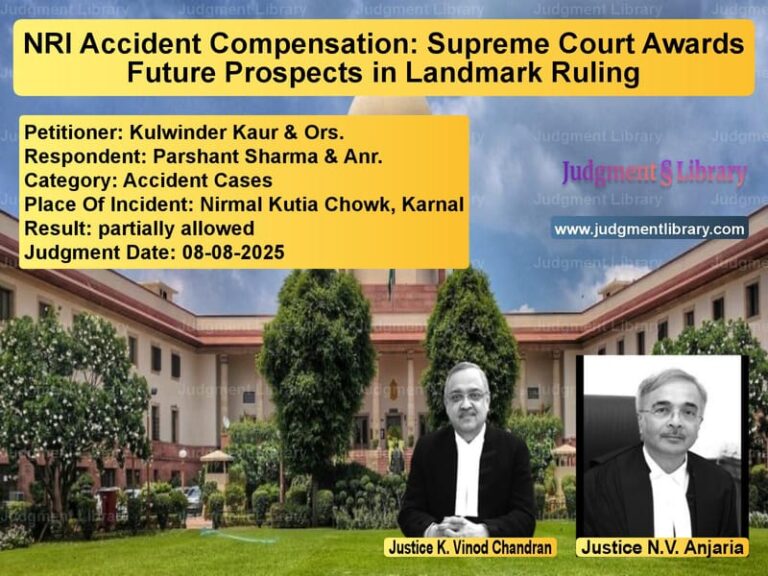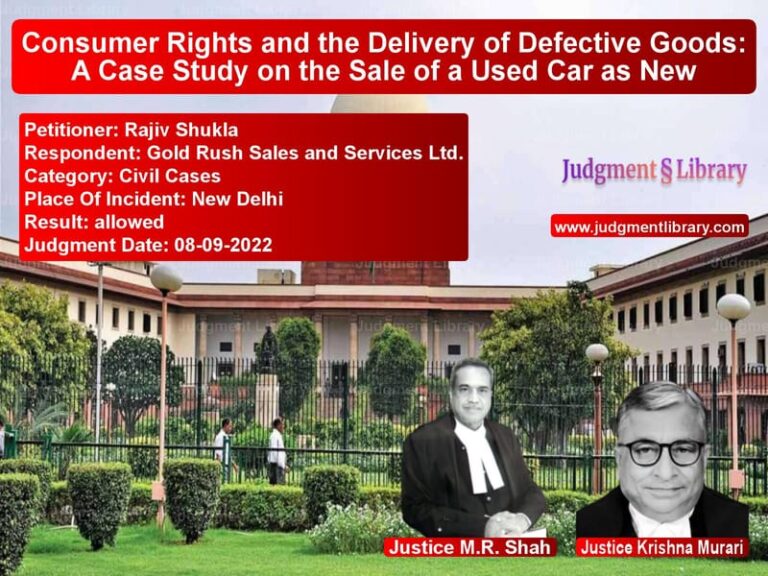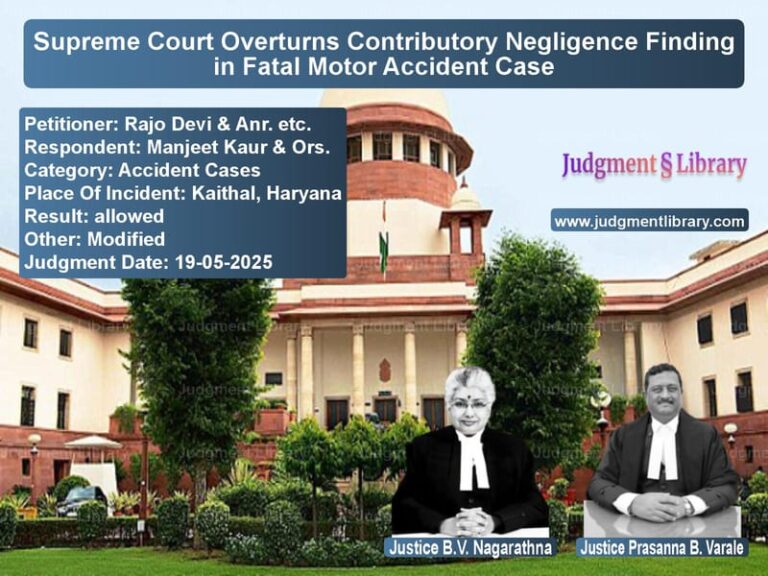Supreme Court Reinstates Attempt to Murder Conviction Under Section 307 IPC
The case of State of Madhya Pradesh vs. Harjeet Singh & Anr. revolves around an attempt to murder charge under Section 307 of the Indian Penal Code (IPC). The Supreme Court had to determine whether the High Court was justified in converting the conviction from Section 307 to Section 324 IPC and significantly reducing the sentence.
Background of the Case
The incident occurred on November 12, 1997, when the victim, Sukhdev, along with his brothers, visited the District Court, Ashok Nagar for a legal matter involving the accused, Harjeet Singh.
According to the prosecution:
- As they were leaving the court premises, Harjeet Singh and his associate, Ramji Lal, confronted Sukhdev and his brothers.
- Following a heated exchange, Harjeet Singh drew a knife and stabbed Sukhdev multiple times, targeting his chest, scapula, back, and hips.
- Ramji Lal, meanwhile, restrained Sukhdev’s brothers to prevent them from intervening.
- Sukhdev collapsed from his injuries, and bystanders rushed him to a nearby hospital.
The police registered an FIR against Harjeet Singh and Ramji Lal under Sections 307 (Attempt to Murder) and 34 (Common Intention) IPC. Medical reports confirmed multiple stab wounds, some of which were dangerously close to vital organs.
Trial Court’s Findings
Based on medical evidence and eyewitness testimony, the First Additional Sessions Judge, Ashok Nagar convicted both accused:
- Harjeet Singh: Convicted under Section 307 IPC (Attempt to Murder) and sentenced to 5 years of rigorous imprisonment with a fine of INR 1,000.
- Ramji Lal: Convicted under Section 307 read with Section 34 IPC and given an identical sentence.
Appeal to the High Court
The accused challenged their conviction in the Madhya Pradesh High Court. Upon review, the High Court:
- Modified Harjeet Singh’s conviction from Section 307 IPC to Section 324 IPC (Voluntarily causing hurt by dangerous weapons).
- Reduced his sentence from 5 years to 1 year of rigorous imprisonment with a fine of INR 1,000.
- Acquitted Ramji Lal, citing inconsistencies in the prosecution’s witness statements.
Petitioner’s Arguments
The State of Madhya Pradesh challenged the High Court’s decision, arguing:
- The attack was premeditated, and Harjeet Singh clearly intended to cause death.
- The severity of the injuries, coupled with multiple stab wounds, indicated an intent to kill.
- Section 307 IPC requires that the act be likely to cause death, and intent can be inferred from the weapon used and the location of injuries.
- The High Court erred in treating the offense as simple hurt rather than an attempt to murder.
- The Trial Court’s decision should be reinstated to ensure justice and maintain deterrence.
Respondent’s Arguments
The defense argued:
- The injuries were not on vital organs, and there was no intent to kill.
- The Trial Court had exaggerated the severity of the injuries.
- The accused had already served one year in prison, and further incarceration was unnecessary.
- There were discrepancies in the prosecution’s witness statements, justifying leniency.
Supreme Court’s Observations
The Supreme Court scrutinized the evidence and emphasized the seriousness of the attack:
“The act of stabbing a person multiple times with a sharp knife, targeting the chest and other vital areas, demonstrates an intention to cause bodily harm that is likely to result in death.”
The Court reaffirmed established legal principles:
- Under Section 307 IPC, intent is determined by the nature of the attack, the weapon used, and the location of injuries.
- Medical reports confirmed deep stab wounds dangerously close to the lungs.
- The Trial Court was correct in its assessment that the attack was not merely a scuffle but a premeditated attempt to kill.
The Supreme Court criticized the High Court for disregarding the extent of injuries and applying Section 324 IPC:
“Reducing a charge under Section 307 IPC to simple hurt under Section 324 IPC dilutes the deterrent effect of criminal law and undermines public confidence in the justice system.”
Final Judgment
The Supreme Court reinstated the Trial Court’s judgment:
- Harjeet Singh’s conviction under Section 307 IPC was restored.
- His sentence of 5 years rigorous imprisonment was reinstated.
- Ramji Lal’s acquittal was upheld due to inconsistencies in the evidence against him.
Conclusion
This judgment reaffirms that the judiciary must not overlook the gravity of violent crimes. The Supreme Court’s decision ensures that undue leniency is not granted in cases where the accused’s actions demonstrate an intent to cause death. The ruling reinforces the principle that serious offenses must be punished proportionately to maintain public trust in the criminal justice system.
Petitioner Name: State of Madhya Pradesh.Respondent Name: Harjeet Singh & Anr..Judgment By: Justice L. Nageswara Rao, Justice Indu Malhotra.Place Of Incident: Ashok Nagar, Madhya Pradesh.Judgment Date: 19-02-2019.
Don’t miss out on the full details! Download the complete judgment in PDF format below and gain valuable insights instantly!
Download Judgment: State of Madhya Prad vs Harjeet Singh & Anr. Supreme Court of India Judgment Dated 19-02-2019.pdf
Direct Downlaod Judgment: Direct downlaod this Judgment
See all petitions in Attempt to Murder Cases
See all petitions in Bail and Anticipatory Bail
See all petitions in Judgment by L. Nageswara Rao
See all petitions in Judgment by Indu Malhotra
See all petitions in allowed
See all petitions in Remanded
See all petitions in supreme court of India judgments February 2019
See all petitions in 2019 judgments
See all posts in Criminal Cases Category
See all allowed petitions in Criminal Cases Category
See all Dismissed petitions in Criminal Cases Category
See all partially allowed petitions in Criminal Cases Category

